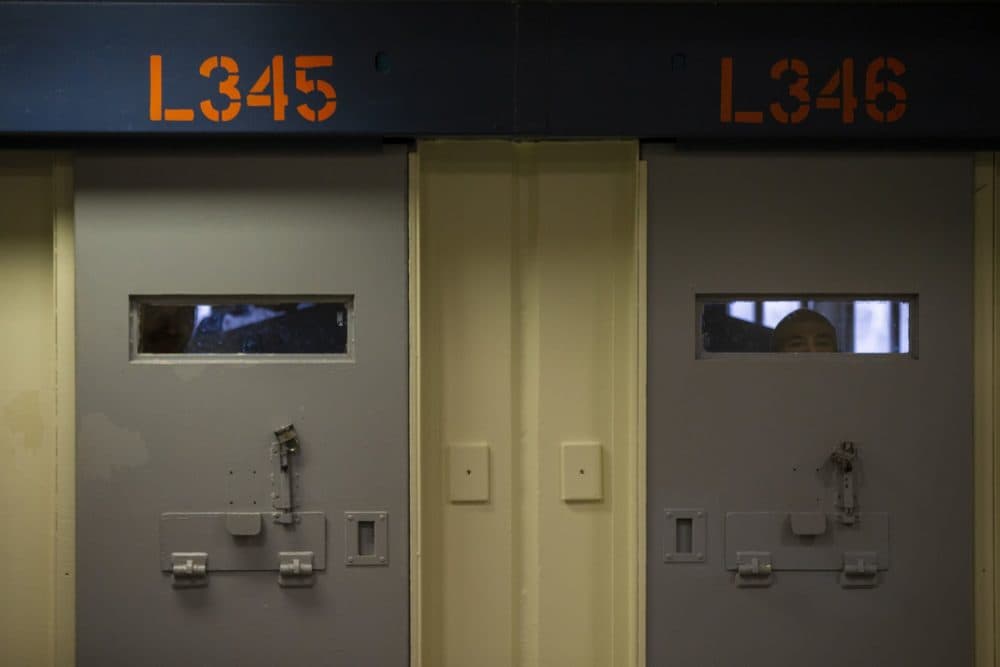Advertisement
Dozens Of Groups Urge Massachusetts Parole Board Reforms Amid Pandemic

After 17 years on parole in Massachusetts, Wayne Lane completed his parole in March of last year — at the start of the coronavirus pandemic. While on parole, Lane, 59, bought a house and began working to help others seeking release from prison on parole.
"I was able to get a second chance and others deserve the same," he said. "It's important, especially during this pandemic, that we give others the opportunity to come home."
Lane works with the group Families for Justice as Healing, which is among the more than 70 organizations that sent a letter to the Baker administration and legislative leaders Tuesday calling for reforms to the state's parole board to help prevent the spread of the coronavirus behind bars.
The letter says while COVID-19 has affected 5% of the state's population, 21% of those incarcerated have tested positive. The signed groups recommend several steps state lawmakers could take, because, the letter says, the board will not act on its own.
"While the introduction of vaccines may, at some point in the future, alleviate some of the problems tied to COVID, the below listed problems with parole are long-standing and will continue to impact prisoners and their families long after the vaccines are administered," the letter reads. "There is a pressing need to address these problems now."
Despite the pandemic and urging from the courts to legally release more people, the board has not increased the percentage of eligible people leaving prison on parole since the start of the pandemic, according to the letter. The letter writers also claim the parole board is incarcerating people on technical parole violations and not because they committed new crimes. At the height of the pandemic, between March and June of 2020, 98 people were returned to prison because of alleged technical parole violations.
The state disputes those numbers and defends the actions of the parole board.
According to the Executive Office of Public Safety and Security, sentencing people to serve time behind bars "has almost completely subsided" since the pandemic began. An EOPSS spokesman said the parole board held nearly 2,200 release hearings and issued about 1,670 release permits between April 3 and Dec. 31.
Revoking parole is not done for minor infractions and helps "interrupt criminogenic behavior," according to the department.
Advertisement
“The Massachusetts Parole Board continues to work toward further reduction of incarcerated populations through holding hearings, granting parole to eligible inmates and providing meaningful supervision in accordance with state law," said EOPSS spokesman Jake Wark in an emailed statement." By adopting new tools, strategies, and partnerships, the Board remains committed to its mission to promote successful re-entry, benefiting both parolees and the communities in which they live.”
The other signatories on the letter include the Greater Boston Interfaith Organization, the National Association of Social Workers and Harvard's Charles Hamilton Houston Institute for Race and Justice. The groups say that, while the data is limited, there are racial disparities in parole rates; more than 56% of the Department of Correction population in 2020 identify as people of color but 40% of the people paroled in 2019 were people of color. The letter says the statistic is "indicative of the structural racism permeating our society."
"Parole is too important a public safety tool to not be functioning effectively. In this time of public awakening, change is necessary and overdue at the Parole Board," the letter reads. "We hope this letter will be an impetus to bringing about meaningful change expeditiously."
The Massachusetts Supreme Judicial Court has urged the governor to use his clemency powers to reduce the number of people incarcerated during the pandemic. In October, the parole board held its first commutation hearing in six years. The board has not yet issued its decision. The letter also urges the board to hold more hearings on clemency requests from those incarcerated.
"The letter lays out policy proposals that should be low-hanging fruit: diversify and expand the parole board; eliminate technical revocations; track comprehensive data on race and ethnicity; above all release more people, release people on time, hold timely hearings, and issue timely decisions," said Katy Naples-Mitchell, with Harvard's Charles Hamilton Houston Institute for Race and Justice. "The proposed reforms are common-sense, evidence-based proposals, and the bare minimum the commonwealth must do to create a functioning parole system."
The groups are asking to meet with lawmakers and the Baker administration to discuss their recommendations.
Wayne Lane hopes the letter will lead to reforms that will be made quickly.
"These people incarcerated — especially those who are older — need to come home, especially during this crisis," Lane said. " They weren't sentenced to death and I wish the system could be reformed in a way to give people opportunities. I've proven that you can come out and live a productive life."
As of Tuesday, 15 prisoners in DOC facilities have died of COVID-19. Two men held in county jails have died of the disease, according to the Supreme Judicial Court. Recent significant outbreaks of the virus are reported at the North Central Correctional Institute in Gardner with 131 positive cases and 37 cases at the Old Colony Correctional Center. Fourteen DOC prisoners are hospitalized with COVID-19, and 48 positive cases are reported at the Worcester County Jail and House of Correction.
